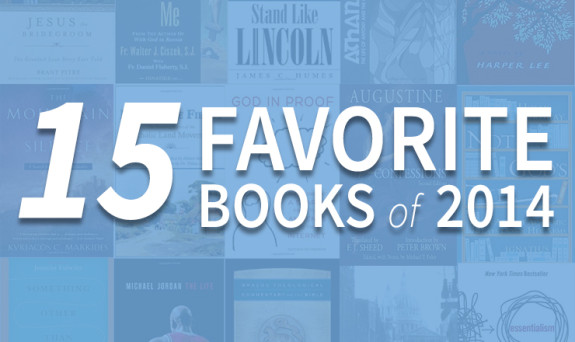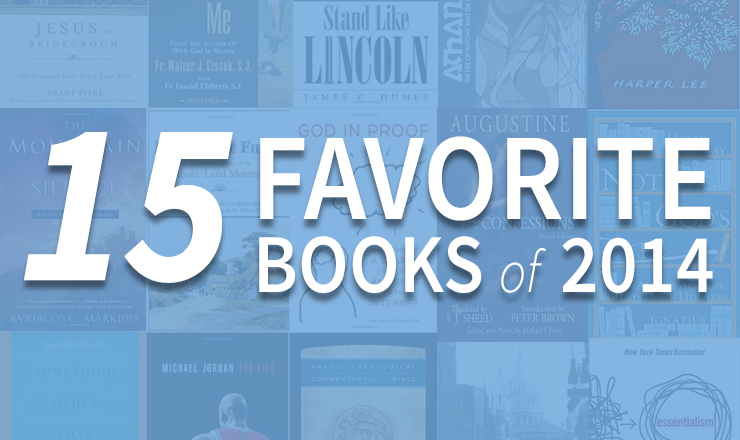At the beginning of each year, I reflect back on some of my favorite books of the past year. I usually try to have this list up by early January but alas, here it is. Better late than never!
I knocked out 61 books in 2014, which might be high for most people but is somewhat low for me. I failed to hit my usual 75 mark this year for a few reasons. First, we welcomed a new baby (our daughter Gianna), then a new job change (thanks Word on Fire!), and then, ironically, I spent much of my time developing a new video course on how to read more books (coming next week!)
Among those 61 books here were my 15 favorites, in reverse order:
15. Jesus the Bridegroom: The Greatest Love Story Ever Told
by Brant Pitre
Image Books, 175 pages, hardcover
Released on March 11, 2014
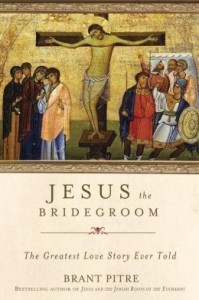 I still consider Pitre’s first book, Jesus and the Jewish Roots of the Eucharist, one of the freshest and most illuminating books on Jesus’ actions during Holy Week. Pitre combined his mastery of Jewish tradition with a breezy style to breathe new life into seemingly familiar events.
I still consider Pitre’s first book, Jesus and the Jewish Roots of the Eucharist, one of the freshest and most illuminating books on Jesus’ actions during Holy Week. Pitre combined his mastery of Jewish tradition with a breezy style to breathe new life into seemingly familiar events.
His newest book applies those gifts to another area of salvation history: God’s marital covenant. From beginning to end, from Adam and Eve to Revelation, the Bible depicts the story of a wedding, a marriage between the Creator and his creation. And the central figure is the Bridegroom God, made flesh in Jesus Christ.
When we read the Gospels through the lens of Jewish nuptial language, the life and mission of Jesus shine in fascinating new ways. Pitre teaches us to see.
14. He Leadeth Me
by Fr. Walter Ciszek
Ignatius Press, 202 pages, paperback
Released on February 1, 1995
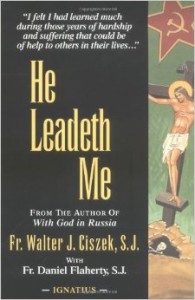 Paradoxically, this was the darkest and most inspiring book I read in 2014. Fr. Ciszek’s account of his twenty-plus years as a prisoner in Soviet labor camps is almost unbelievable in its desolation.
Paradoxically, this was the darkest and most inspiring book I read in 2014. Fr. Ciszek’s account of his twenty-plus years as a prisoner in Soviet labor camps is almost unbelievable in its desolation.
Fr. Ciszek was a young and dynamic priest, committed to evangelizing the poor in Russia, but after being captured and mistaken for a spy, he lost everything—his friends, his freedom, and nearly his sense of hope.
Yet he somehow clung to his faith, trusting not only that God would lead him out of such misery but, miraculously, that the misery itself was part of God’s permissive will, that somehow it was contributing to his own sanctification.
How can someone survive two decades in the Siberian gulags and actually emerge with more faith? How can a person bear such gut-wrenching despair and still pray, “thy will be done”? This modern-day Job story provides many clues.
13. Speak Like Churchill, Stand Like Lincoln: 21 Powerful Secrets of History’s Greatest Speakers
by James Humes
Three Rivers Press, 224 pages, paperback
Released on April 23, 2002
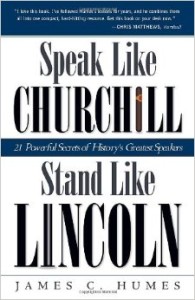 This year I spoke at over ten events and conferences. I love to give talks and I’m always trying to improve. This is one of the best books I’ve read on the topic. Many other speaking books cover things like slideshow presentations and audience interaction. Those are important but this one covers less-discussed topics like posture, body language, and rhetorical rhythm. I’ve started using these strategies and have already noticed a positive response.
This year I spoke at over ten events and conferences. I love to give talks and I’m always trying to improve. This is one of the best books I’ve read on the topic. Many other speaking books cover things like slideshow presentations and audience interaction. Those are important but this one covers less-discussed topics like posture, body language, and rhetorical rhythm. I’ve started using these strategies and have already noticed a positive response.
James Humes, the author of the book, served as a speech writer for five American presidents (!!) and has helped numerous CEOs master the art of delivering great presentations. His book is full of practical examples from some of the greatest speakers in history, many of whom he’s worked with personally. So that lets you see Humes’ advice in action (and it also confirms he knows what he’s talking about.)
If you want to become a better public speaker in 2015, pick up this book.
12. The Life of Antony
by St. Athanasius
Paulist Press, 192 pages, hardcover
Written around 360 AD
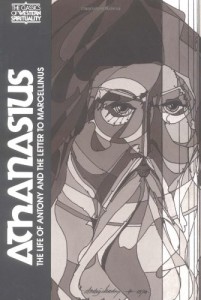 I’ve read this book twice, both times during Lent, and each time it sent a jolt through my system. St. Antony was the original desert monk, exchanging a comfortable life for a cave in order to conquer his passions. While there he practiced extreme asceticism, fasting for days, spending long hours in prayer, and isolating himself from other.
I’ve read this book twice, both times during Lent, and each time it sent a jolt through my system. St. Antony was the original desert monk, exchanging a comfortable life for a cave in order to conquer his passions. While there he practiced extreme asceticism, fasting for days, spending long hours in prayer, and isolating himself from other.
Athanasius recounts that during this time, the devil launched an onslaught of spiritual attacks against Antony. He sent wild beasts such as lions and snakes, roaring, hissing, and threatening to eat the holy monk. The devil’s goal was to tempt Antony to despair. But he did not succeed.
Another time, the devil sent demon underlings to mercilessly beat Antony, again tempting Antony to denounce the God, whom he trusted for protection. When visiting monks happened upon Antony’s cave, they found Antony covered in welts and bruises. Yet the beating did not cause his faith to waver. In fact, it grew.
Antony eventually emerged from the cave utterly in control of his passions and fleshly desires. Out of this mastery flowed a wellspring of spiritual wisdom, saved by Athanasius in the form of parables and aphorisms, words that still rumble with power today.
11. To Kill a Mockingbird
by Harper Lee
Grand Central Publishing, 384 pages, paperback
First published in 1960
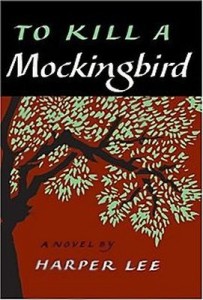 To Kill a Mockingbird was Harper Lee’s only book, which won a Pulitzer Prize and is widely considered a classic. For some reason, I never had to read it in high school (of if it was assigned, I didn’t heed it.) I had not seen the movie versions and I didn’t know anything about the book, but several friends raved about it, with more than one friend citing it as his or her favorite book of all time. All of those accolades led me to pick it up.
To Kill a Mockingbird was Harper Lee’s only book, which won a Pulitzer Prize and is widely considered a classic. For some reason, I never had to read it in high school (of if it was assigned, I didn’t heed it.) I had not seen the movie versions and I didn’t know anything about the book, but several friends raved about it, with more than one friend citing it as his or her favorite book of all time. All of those accolades led me to pick it up.
It did not disappoint. Its absorbing glimpse into the post-Civil War South evokes other Southern novelists like Flannery O’Connor, Mark Twain, William Faulkner, and Walker Percy. Lee beautifully depicts the slow country life, with its tenuous balance of idyllic living and deeply embedded racism.
Her balancing force is Atticus Finch, who emerges as one of the most admirable, heroic depictions of fatherhood in modern fiction. After closing the book, I tried to think of another fictional husband or father whom I would more want to emulate. I couldn’t think of one. Finch is marked by unwavering virtue and humility, accepting the pitiful and hopeless task of defending a black man accused of raping a white woman in the segregated South. A man who willingly sacrifices, who exudes loves for his children, who displays heroic virtue in the face of difficulty and violence—that’s the kind of man I yearn to be.
(Coincidentally, it was just announced yesterday that a second Harper Lee book has been uncovered and will soon be published.)
10. The Mountain of Silence: A Search for Orthodox Spirituality
by Kyriacos Markides
Image Books, 272 pages, paperback
Released on November 19, 2002
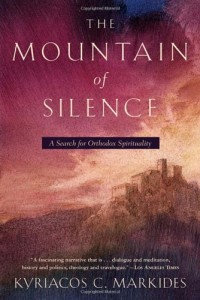 The spiritual tradition of Eastern Christianity is sometimes ignored by us in the West. But Markides’ enchanting memoir shows why its worth exploring.
The spiritual tradition of Eastern Christianity is sometimes ignored by us in the West. But Markides’ enchanting memoir shows why its worth exploring.
Markides recounts his experiences visiting Mount Athos, that heavenly summit in Greece, home to twenty Eastern Orthodox monasteries. Mount Athos is famous for its otherworldly sanctity and has long been a popular pilgrimage site among people searching for living saints.
The Mountain of Silence is mostly made up of conversations between Markides, who plays the part of a scientific, semi-religious skeptic, and Father Maximos, a wise Athos monk and legendary patriarch on the mountain.
Father Maximos’ stories are mysterious and enigmatic—many pleasantly haunted me for days. His advice on prayer on quieting the mind was especially insightful.
Pick up this book if you want to dip your toe into the rivers of mysticism and beauty found in the Orthodox tradition.
9. Flee to the Fields: The Founding Fathers of the Catholic Land Movement
by Hilarie Belloc and others
IHS Press, 144 pages, hardcover
Originally published in 1934
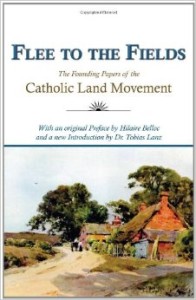 The Catholic Land Movement is a small, but growing initiative which finds it roots in early-twentieth-century England. The founders included many of the brightest and most popular writers of the day, such as G.K. Chesterton and Hilarie Belloc, who collectively saw the need for a “third way” between capitalism and socialism. They devised (or reintroduced, or classified) an economic system known as Distributism, grounded on Catholic social teaching and particularly the landmark encyclical, Rerum Novarum, by Pope Leo XIII. Distributism involved spreading land ownership and the means of labor to as many people as possible. In other words, anti-Industrialism. Or in Catholic parlance, a “subsidiarity” economy, one based on the family.
The Catholic Land Movement is a small, but growing initiative which finds it roots in early-twentieth-century England. The founders included many of the brightest and most popular writers of the day, such as G.K. Chesterton and Hilarie Belloc, who collectively saw the need for a “third way” between capitalism and socialism. They devised (or reintroduced, or classified) an economic system known as Distributism, grounded on Catholic social teaching and particularly the landmark encyclical, Rerum Novarum, by Pope Leo XIII. Distributism involved spreading land ownership and the means of labor to as many people as possible. In other words, anti-Industrialism. Or in Catholic parlance, a “subsidiarity” economy, one based on the family.
Today, a growing number of Distributists follow in their footsteps, seeing the need to “flee to the fields” in response to the spiritually-deadening effects of urban/suburban Industrialism. These Distributists are not escaping but pursuing—their “fleeing” is to something (the fields) rather than from something. They see that while factories and cubicles pull fathers away from their families for most of the day, the fields keep them home. Where modern capitalism puts wealth in the hands of a few, Distributism brings ownership and labor back into the hands of each common man, allowing him control of his own destiny (and his own dignity.)
I’ve been deeply drawn to this philosophy over the past year, in part through my G.K. Chesterton reading group, but also because so many of my heroes espouse it. Besides Chesterton and Belloc, you can see Distributism throughout the fiction of J.R.R. Tolkien (the Shire is the Distributist ideal) and in Pope Pius XI’s Quadragesimo anno and the writings of Pope Francis.
Which brings me to Flee to the Fields. This book, a collection of essays by the founding fathers of Distributism and has become a sort of field manual for the Catholic Land Movement, the social movement based on the Distributist economy. While a few of the contributions are heady and abstract, most are practical and clear. They persuasively argue that, to paraphrase Chesterton, the Distributist ideal has not been tried and found wanting; it’s been found difficult and left untried.
If you want to understand Distributism and see why so many Catholic intellectuals embrace it, this book is an excellent primer.
8. God in Proof: The Story of a Search from the Ancients to the Internet
by Nathan Schneider
University of California Press, 272 pages, hardcover
Released on June 10, 2013
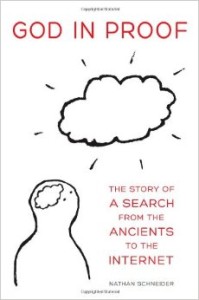 Over the last couple years, thanks to my work at StrangeNotions.com, I’ve focused lots of reading on natural theology, philosophy, and atheism. I’m fascinated by arguments for and against God—Aristotle’s First Cause argument, Augustine’s Truth argument, Anselm’s Ontological argument, Aquinas’ Five Ways—as well as contemporary arguments from people such as William Lane Craig and Alvin Plantinga. I’m convinced we’re living in a philosophical renaissance in which more people are engaging these arguments than ever before.
Over the last couple years, thanks to my work at StrangeNotions.com, I’ve focused lots of reading on natural theology, philosophy, and atheism. I’m fascinated by arguments for and against God—Aristotle’s First Cause argument, Augustine’s Truth argument, Anselm’s Ontological argument, Aquinas’ Five Ways—as well as contemporary arguments from people such as William Lane Craig and Alvin Plantinga. I’m convinced we’re living in a philosophical renaissance in which more people are engaging these arguments than ever before.
Nathan Schneider would agree. Growing up, he oscillated toward and away from faith, but in college he became deeply intrigued by the arguments for God. He began formal studies in philosophy and started reading the great thinkers. But he also traveled the world interacting with people on either side of today’s God-atheism debate. He had lunch with Richard Dawkins, dialogued with Fundamentalist apologists, visited Craig’s philosophy classes, and even began spiritual direction under a Catholic priest. In the end (spoiler alert!) he became a Catholic.
God in Proof captures the whole journey. Part memoir, part history, and part philosophy, it reveals one man’s hunt for certainty about the most important question of all: is there a God?
(An especially helpful part of the book is the Appendix, which collects and classifies all of the most popular arguments for God.)
7. Confessions (trans. Frank Sheed)
by St. Augustine
Hackett Publishing Company, 384 pages, paperback
Released on September 1, 2006
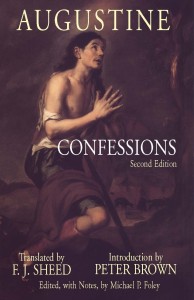 I’ve read St. Augustine’s classic a few times now, each time using a different translation. The book hardly needs my commentary but I will say two things.
I’ve read St. Augustine’s classic a few times now, each time using a different translation. The book hardly needs my commentary but I will say two things.
First, if you haven’t read it, read it now. Otherwise you’re missing one of the gems not only of Catholicism but of the Western literary tradition.
Second, when you do read it, be sure to use Frank Sheed’s magnificent translation. Augustine was both a poet and a philosopher, which makes his work sometimes difficult to translate. But I think Sheed best captures that balance.
Peter Kreeft found Sheed’s translation to be “as living as molten lava.” I completely agree.
6. Not God’s Type: An Atheist Academic Lays Down Her Arms
by Holly Ordway
Ignatius Press, 215 pages, hardcover
Released on October 7, 2014
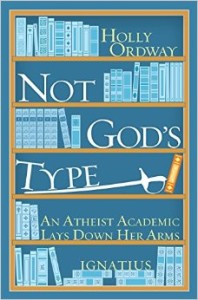 For many years, Holly Ordway was convinced that God was little more than superstition, unsupported by evidence or reason. She later attained a PhD in literature, traveled the country as a competitive fencer, and became a college English professor, none of which left room for God.
For many years, Holly Ordway was convinced that God was little more than superstition, unsupported by evidence or reason. She later attained a PhD in literature, traveled the country as a competitive fencer, and became a college English professor, none of which left room for God.
But one day a smart and respected friend surprised her by revealing he was a Christian. That shook Holly and sent her on a search for the truth about God, one that weaved through literature, aesthetics, imagination, and history. She came under the spell of the Inklings—C.S. Lewis, J.R.R. Tolkien, Charles Williams—and like many of them, began to find faith. Her journey culminated in 2012 when, after a short time in an Anglican community, she entered the Catholic Church.
Not God’s Type records her probing story and is fantastically written. At times Holly’s prose is almost poetic, causing you to pause and reflect on the simple elegance of her writing. Her conversion is also, in one sense, a journey through books. She describes how several books each led her one step forward, including Mere Christianity, The Lord of the Rings, In Defense of Miracles, N.T. Wright’s work, and more. Those two elements, the imaginative and the literary, make this an utterly unique conversion story.
For book lovers, fans of the Inklings, and anyone interested in how a sharpened atheist could end up Catholic, this book is for you.
5. Something Other Than God: How I Passionately Sought Happiness and Accidentally Found It
by Jennifer Fulwiler
Ignatius Press, 256 pages, hardcover
Released on April 29, 2014
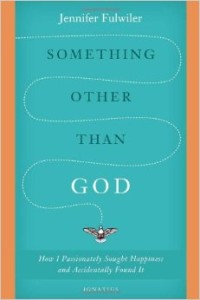 This is the third atheist-to-Catholic conversion story I read this year. Each shined in its own way. God in Proof grappled with the philosophical questions involved, and Not God’s Type showed how literature and imagination play a key role.
This is the third atheist-to-Catholic conversion story I read this year. Each shined in its own way. God in Proof grappled with the philosophical questions involved, and Not God’s Type showed how literature and imagination play a key role.
But as Pope Benedict XVI responded when asked how many paths there are to God, “As many as there are people.” Something Other Than God reveals another path.
Like the other two, this book is extremely well-written from a literary perspective. Jennifer’s pacing and development, her masterful balance of deep existential questions and light humor, carries the mark of a New York Times bestseller. Very few people can make good writing look so easy, but Jennifer does.
Also unique is how Jennifer finds her way to faith, which is essentially through despair. After pondering her atheism she arrives at nihilism, realizing that if there is nothing beyond the natural world, then there is no objective ground for meaning or human dignity. Yet she can’t accept that conclusion. Looking at her newborn son, she could not believe that he was simply a blob of matter different only in form, but not substance, from other animals or plants. That dissonance led her on a search for the “something more”, the transcendent source of these values she knew existed.
Of course, she didn’t want that “something” to be God (hence the title.) She hung tight to her atheism and honed her arguments against God by debating Christian friends, in person and online. But secretly she began reading books by Christian apologists and thinkers. She slowly made her way to theism, and then thanks especially to the counter-cultural moral teachings of the Catholic Church, she decided to become Catholic in 2007.
Again, I can’t emphasize how enjoyable and well-written this book is. If it wasn’t for the latent anti-Catholic bias among many bestseller lists (ahem, New York Times and Wall Street Journal), this book would have soared up many lists (and should have, based on the number of copies sold.) But that doesn’t matter. Regardless of where it’s listed, this is one of the spiritual memoirs I’ve read, certainly of this century, and rightfully stands alongside classics like Dorothy Day’s The Long Loneliness and Thomas Merton’s Seven Storey Mountain.
4. Michael Jordan: The Life
by Roland Lazenby
Little, Brown, and Company, 720 pages, hardcover
Released on May 6, 2014
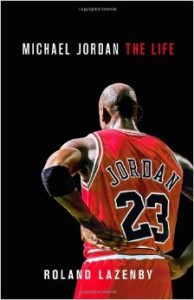 In 2013 I read Walter Issacson’s thick biography of Steve Jobs, whom he depicted as both complicated and transcendent, a visionary difficult to pin down. This year I tackled Roland Lazenby’s biography of Michael Jordan and discovered almost a mirror image.
In 2013 I read Walter Issacson’s thick biography of Steve Jobs, whom he depicted as both complicated and transcendent, a visionary difficult to pin down. This year I tackled Roland Lazenby’s biography of Michael Jordan and discovered almost a mirror image.
Both Jobs and Jordan were driven to perfection. Jobs demanded it from his designers, even when they crafted parts within a computer that consumers would never see. Jordan pursued it in every competitive activity, whether basketball, golf, or cards.
For both men, their gifts were also their downfall. Their single-minded commitment to perfecting their crafts led to dysfunction in their families and personal lives. Lazenby captures that especially well with Jordan. Despite being the best-known and perhaps richest athlete in human history, Jordan was never satisfied. He always wanted more, more success and domination, even if it cost him his marriage and his sanity.
For diehard basketball fans, Lazenby’s biography offers several fascinating anecdotes from Jordan’s time with the Bulls, as well as his later forays (and failings) with the Wizards and Bobcats. Lazenby’s greatest accomplishment, though, is confirming a timeless spiritual truth: that the very things that make us great—for Jordan his drive, focus, and confidence—can lead to our destruction if left unchecked.
3. 2 Samuel (Brazos Theological Commentary on the Bible)
by Fr. Robert Barron
Brazos, 240pages, hardcover
Released on May 5, 2015
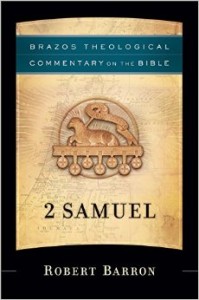 A perk of working at Word on Fire is that I had the privilege of editing Fr. Barron’s commentary on 2 Samuel. And do I ever mean privilege.
A perk of working at Word on Fire is that I had the privilege of editing Fr. Barron’s commentary on 2 Samuel. And do I ever mean privilege.
Fr. Barron’s contribution to the Brazos Theological Commentary Series is a unique blend of narrative, illuminating detail, and sharp exegesis. At the outset, Fr. Barron explains that his commentary is decidedly not a historical-critical commentary, which would probe 2 Samuel’s various sources and textual variants. Instead, it’s a theological commentary, constantly asking the question, “What does this passage reveal to us about God?”
The vivid story of David’s rise and fall sheds plenty of light on that question. It is, in many ways, the pivotal narrative in Scripture. It’s the hinge on which salvation history swings from the kingdom of Israel to the definitive and eternal King, born a son of David. Fr. Barron walks us through the story, pulling from Jewish tradition, the Church Fathers, contemporary biblical scholarship, and a healthy dose of art and literature. The resulting commentary is not just biblically astute but readable and mesmerizing. Commentaries typically scare off Christians outside of academia, but this is one of the most refreshing and accessible I’ve come across.
Although it won’t officially debut until mid-2015, you can pre-order it now.
2. The Ball and the Cross
by G.K. Chesterton
Dover, 192 pages, paperback
Originally published in 1909
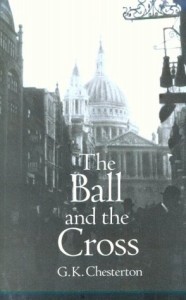 Being part of the Central Florida G.K. Chesterton Society meant I read a dozen Chesterton books this year. The Ball and the Cross was my runaway favorite. It features two of Chesterton’s most memorable characters—a zealous, Scotish Catholic who wears his faith on his sleeve, and a staunch, “free-thinking” atheist who distributes humanist literature. Both are deeply committed to their beliefs, so much so that they’re willing to fight (and die) for them. The problem is, nobody else takes them seriously. The two zealots are the last men in Europe who think religion is worth fighting over and thus, once they commit to a duel to finally settle their dispute, the whole country conspires to stop them.
Being part of the Central Florida G.K. Chesterton Society meant I read a dozen Chesterton books this year. The Ball and the Cross was my runaway favorite. It features two of Chesterton’s most memorable characters—a zealous, Scotish Catholic who wears his faith on his sleeve, and a staunch, “free-thinking” atheist who distributes humanist literature. Both are deeply committed to their beliefs, so much so that they’re willing to fight (and die) for them. The problem is, nobody else takes them seriously. The two zealots are the last men in Europe who think religion is worth fighting over and thus, once they commit to a duel to finally settle their dispute, the whole country conspires to stop them.
The Ball and the Cross is classic Chesterton, full of irony, humor, fast-paced dialogue, and several imaginative twists. In our religiously tepid world, which is even more ambivalent toward God than when Chesterton lived, this weighty novel demands we take faith seriously.
1. Essentialism: The Disciplined Pursuit of Less
by Greg McKeown
Crown, 272 pages, hardcover
Released on April 15, 2014
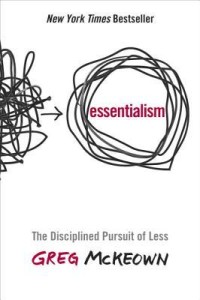 I just can’t stop talking about this book to friends and family. Of everything I read this year, Greg McKeown’s Essentialism changed my life the most. It’s affected every area for me—work, personal projects, reading, marriage, parenting, spiritual life—by forcing me to ask a simple question, over and over again: is this essential?
I just can’t stop talking about this book to friends and family. Of everything I read this year, Greg McKeown’s Essentialism changed my life the most. It’s affected every area for me—work, personal projects, reading, marriage, parenting, spiritual life—by forcing me to ask a simple question, over and over again: is this essential?
We all find ourselves bombarded with opportunities and requests, in no small part because of the Internet. We’re encouraged to join this program, take on this project, start that initiative, watch this video, reply to this email, sign up for this newsletter, meet with this person, etc. Since most of us are terrified of saying “No,” and because of our FOMO (fear of missing out), we constantly attempt to squeeze one more thing into our already-busy lives.
But as McKeown explains, this has devastating consequences. It leads to us majoring in minors and spending most of our time on the trivial many tasks instead of the essential few. The solution is to become an essentialist, one who takes on only pursuits that truly matter.
According to McKeown’s advice, any time you receive an invitation or request or feel the urge to take on a particular task, ask yourself, “On a scale of 1-10, how essential is this?” If the answer is anything eight or below, then it’s a zero. If it’s a nine or ten, you embrace it. That one piece of advice has already saved me hours and hours of good, but not essential commitments.
McKeown is not religious, but for me, as a Catholic, I repeatedly heard echoes in this book of Jesus’ command to pursue “the one thing necessary.” Jesus was an essentialist and it’s precisely what he demands of his followers.
The principles within Essentialism will declutter your life, teach you to say “no” to the non-essentials, and give you clarity on what you should be doing with your time. After just a few months of practicing these tactics I feel more focused and accomplished than at any point in my life.
What were some of your favorite books of 2014?
What I’ve Read in Past Years
2014
2013
2012
2011
2010

